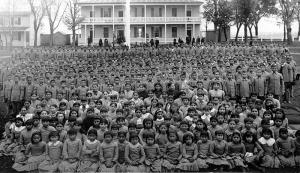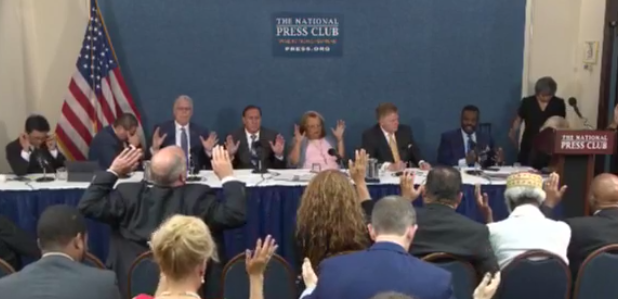Although my name won’t show up for awhile, I just added my name to the signers of the letter below. It appears to me that the letter is clearly aimed at Donald Trump, his evangelical defenders and particularly Trump’s ambiguous response to the racist protests in Charlottesville.
The letter was posted this morning at the Gospel Coalition blog and reblogged by John Fea, which is where I saw it. Below the letter is reproduced in full and I have taken the liberty of adding my name to the list of signers. Other profs who want to sign should contact Mark David Hall using the instructions below.
An Open Letter from Christian Scholars on Racism in America Today
Like many Americans, we are grieved by recent events in Charlottesville. The white supremacist rally there showed that overt racism is alive and well in America, and that it can turn violent and murderous. As Christian scholars of American history, politics, and law, we condemn white supremacy and encourage frank dialogue about racism today.
As Americans, we love our country. As Christians, we know that no individual, people, or nation is perfect. Among the most grievous sins committed by early Americans was the enslavement of and trafficking in Africans and African Americans. Slavery was formally abolished in 1865, but racism was not. Indeed, it was often institutionalized and in some ways heightened over time through Jim Crow legislation, de facto segregation, structural inequalities, and pervasively racist attitudes. And other persons of color, including Native Americans, Asian-Americans, and Hispanic-Americans, have often been subjected to official and unofficial discrimination. What we have seen in Charlottesville makes it clear once again that racism is not a thing of the past, something that brothers and sisters of color have been trying to tell the white church for years.
Racism should be denounced by religious and civic leaders in no uncertain terms. Equivocal talk about racist groups gives those groups sanction, something no politician or pastor should ever do. As Christian scholars, we affirm the reality that all humans are created in the image of God and should be treated with respect and dignity. There is no good moral, biblical, or theological reason to denigrate others on the basis of race or ethnicity, to exalt one race over others, or to countenance those who do.
Even as we condemn racism, we recognize that the First Amendment legally protects even very offensive speech. Rather than trying to silence those with whom we disagree, or to meet violence with more violence, we encourage our fellow citizens to respond to groups like the neo-Nazis, white supremacists, and the Ku Klux Klan with peaceful counter-protests. (Indeed, this has been the approach of the vast majority of counter-protesters in recent weeks.) No one is beyond redemption, so we encourage our fellow believers to pray that members of these groups will find the truth, and that the truth will set them free.
We also recognize that white-majority churches and denominations have too often lagged in discussions of racial injustice and inequality, or have even been sources of the perpetuation of white cultural dominance and racial injustice. Because of that history, we pray that America’s churches and Christians will renew their commitment to practical, proactive steps of racial reconciliation and friendship in our cities and towns.
Respectfully,
Mark David Hall, George Fox University
Thomas S. Kidd, Baylor University
We, the undersigned, are Christian scholars who endorse this letter. Institutional affiliations are listed for identification purposes only. [If you would like to add your name to this letter, please send an email to Mark David Hall at [email protected].]
Scott Althaus, University of Illinois at Urbana-Champaign
Bryan Bademan, Anselm House
Richard A. Bailey, Canisius College
Scott Barton, East Central University
David Beer, Malone University
Daniel Bennett, John Brown University
Thomas C. Berg, University of St. Thomas School of Law (Minnesota)
Amy E. Black, Wheaton College
Edward J. Blum, San Diego State University
Bradley J. Birzer, Hillsdale College
William S. Brewbaker III, University of Alabama
Margaret Brinig, University of Notre Dame Law School
Matthew S. Brogdon, University of Texas at San Antonio
Thomas E. Buckley, Santa Clara University
Sean R. Busick, Athens State University
James P. Byrd, Vanderbilt University
Jay R. Case, Malone University
Justin Clardie, Northwest Nazarene University.
Robert F. Cochran, Jr., Pepperdine University School of Law
Elesha Coffman, Baylor University
Kimberly H. Conger, University of Cincinnati
K. Scott Culpepper, Dordt College
Michelle D. Deardorff, University of Tennessee at Chattanooga
Michael J. DeBoer, Faulkner University Thomas Goode Jones School of Law
Jonathan Den Hartog, University of Northwestern-St. Paul, MN
Daniel Dreisbach, American University
W. Cole Durham, Jr., J. Reuben Clark Law School
Mark Edwards, Spring Arbor College
John Fea, Messiah College
Joel S. Fetzer, Pepperdine University
Nathan A. Finn, Union University
Kahlib J. Fischer, Liberty University
Matthew J. Franck, Witherspoon Institute
Beverly A. Gaddy, University of Pittsburgh
Edward McGlynn Gaffney, Valparaiso University School of Law
Loramy Gerstbauer, Gustavus Adolphus College
Naomi Harlin Goodno, Pepperdine University School of Law
Christopher R. Green, University of Mississippi School of Law
Jay Green, Covenant College
John G. Grove, Lincoln Memorial University
Darren Guerra, Biola University
Barry Hankins, Baylor University
Rusty Hawkins, Indiana Wesleyan University
Gail L. Helt, King University
Nicholas Higgins, Regent University
Lia C. Howard, Saint Joseph’s University
Andrew Kaufmann, Northwest University
Lyman Kellstedt, Wheaton College
Douglas L. Koopman, Calvin College
Wilfred M. McClay, University of Oklahoma
Gerald R McDermott, Beeson Divinity School
Tracy McKenzie, Wheaton College
Ron Miller, Liberty University
Christopher D. Moore, Bethel University
Lincoln A. Mullen, George Mason University
Miles S. Mullin II, Hannibal-LaGrange University
Paul Otto, George Fox University
Mikael L. Pelz, Calvin College.
Jonathan R. Peterson, North Park University
Daniel Philpott, University of Notre Dame
Otis W. Pickett, Mississippi College
Richard Pointer, Westmont College.
Charles J. Reid, Jr., University of St. Thomas School of Law (Minnesota)
Sosamma Samuel-Burnett, G.L.O.B.A.L Justice
Shelley Ross Saxer, Pepperdine University School of Law
Gregory Sisk, University of St. Thomas School of Law (Minnesota)
Corwin E. Smidt, Calvin College
Brian A. Smith, Montclair State University
Gary Scott Smith, Grove City College
Sarah A. Morgan Smith, The Ashbrook Center at Ashland University
Chris Soper, Pepperdine University
Andrew Spiropoulos, Oklahoma City University School of Law
Susan J. Stabile, University of St. Thomas School of Law (Minnesota)
Justin Taylor, Crossway Books
Boz Tchividjian, Liberty University School Law
H. Paul Thompson, Jr., North Greenville University
Warren Throckmorton, Grove City College
Benjamin Toll, Lake Superior State University
Noah J. Toly, Wheaton College
John Turner, George Mason University
Andrea L. Turpin, Baylor University
Patrick Van Inwegen, Whitworth University
Robert K. Vischer, University of St. Thomas School of Law (Minnesota)
Jennifer E. Walsh, Azusa Pacific University
Micah Watson, Calvin College
Virgil Wiebe, University of St. Thomas School of Law (Minnesota)
John Wigger, University of Missouri
Daniel K. Williams, University of West Georgia
James E. Wren, Baylor Law School
Paul D. Yandle, North Greenville University
John C. Yoder, Whitworth University
 As has been widely reported, White House Chief of Staff John Kelly last night on the Laura Ingraham Show said Robert E. Lee was an honorable man and the Civil War was fought because the North and South couldn’t compromise. Kelly was brought into the White House to keep Trump from stepping on verbal landmines. However, he has stepped on a few of his own in recent days.
As has been widely reported, White House Chief of Staff John Kelly last night on the Laura Ingraham Show said Robert E. Lee was an honorable man and the Civil War was fought because the North and South couldn’t compromise. Kelly was brought into the White House to keep Trump from stepping on verbal landmines. However, he has stepped on a few of his own in recent days.
